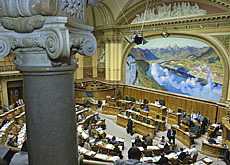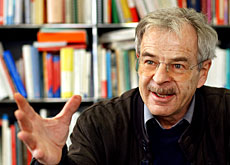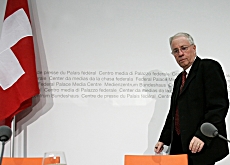Storm brews before final parliamentary debate

The autumn session of parliament gets underway on Monday amid a heated political climate in the run-up to October's general election.
Tax breaks, army guns, citizenship and funding for research and education will most likely provide the ground for verbal exchanges between representatives of the five main parties.
The speaker of the House of Representatives, Christine Egerszegi, is expected to open the three-week session with a warning, having made it clear that she would not tolerate unfair allegations and attacks by parliamentarians during the debates.
“I will remind all members that they pledged to respect each other in their parliamentary work,” she told public radio.
Egerszegi referred to an unusually harsh tone – for Switzerland – in discussions among politicians over the past few weeks.
The election campaign is dominated by the rightwing Swiss People’s Party. It accused its political opponents of plotting against the party’s controversial justice minister, Christoph Blocher, after he had come in for harsh criticism by a key parliamentary committee.
Citizenship, ammunition
A proposal by the People’s Party to give voters and communes the final say in granting Swiss citizenship to foreigners is tabled in the Senate. It contains a clause which excludes the possibility to appeal against the outcome of a vote.
The other parliamentary chamber, the House of Representatives, earlier this year backed a compromise plan. It would allow ballot box decisions – despite a veto by the supreme court – but also the right of appeal.
Another potential powder keg is a plan to ban the storing of virtually all ammunition for army firearms outside arsenals. As part of the Swiss militia army system Swiss soldiers keep their personal guns including several rounds of ammunition.
Switzerland’s traditionally liberal gun laws are a hot topic of debate. The left, trade unions and the church are pushing for a wide-ranging ban on storing firearms at home.
During the first week the House will devote time to a major debate about an increase in the budget for research and education.
The government draft foresees a SFr21.2 billion ($17.9 billion) package over the next four years. The debate is expected to focus on the share of funds for universities and technical colleges as well as the country’s leading research body.

More
Speaker of the House of Representatives
Money matters
Proposals for tax breaks are also on the parliamentary agenda. All the main parties will try to use the debates to showcase their ideas hoping to increase their electoral support.
The centre-left Social Democrats want higher taxes for big earners and the centre-right Christian Democrats are campaigning for tax relief for families.
The Radicals have called for a complete overhaul of the tax system, while the People’s Party slogan reads “Fewer taxes for all”.
Seasoned parliamentarians are pessimistic about such debates.
“It’s simply an opportunity to let off steam,” said Hermann Weyeneth, ahead of what will be his last parliamentary session before retiring.
swissinfo, Urs Geiser and Andrea Tognina
The three-week autumn session, which ends on October 5, is the last one of the current four-year term.
Elections to the House of Representatives and most seats in the Senate are scheduled for October 21.
The new parliament will elect the new cabinet in its first session in December.
Parliament is hoping to give final approval to a partial reform of the health system, which is considered one of the best worldwide but also very expensive.
The Senate is to consider proposals aimed at easing access to hospitals for patients from other regions of the country.
The debate is part of a plan to reduce hospital costs, which account for more than a third of total health expenditure.
It is also due to decide on plans to curb expenditure for healthcare by defining the financial responsibilities of patients, health insurers and the state.

In compliance with the JTI standards
More: SWI swissinfo.ch certified by the Journalism Trust Initiative




You can find an overview of ongoing debates with our journalists here . Please join us!
If you want to start a conversation about a topic raised in this article or want to report factual errors, email us at english@swissinfo.ch.